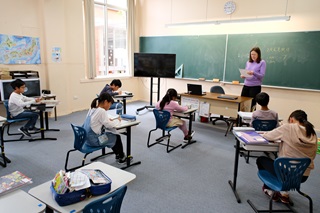JSM general information
The Japanese School of Melbourne is an independent school which provides education to Japanese children from Foundation to Year 9 with Japanese as the language of instruction. The School is recognised as a specific purpose school by Victorian Department of Education and Early Childhood Development. The curriculum is based on Japanese Ministry of Education, Culture, Science, Sports, and Technology policy and guidelines. Subjects taught are Japanese, Social Studies, Integrated Studies, Science, Mathematics, Music, Arts, Physical Education, Home-Economics and English. All subjects are taught in Japanese except English.


EAL rationale
Our students are predominantly children of expatriates and their enrolment typically spans 2 to 5 years. After Year 9, most return to Japan to enter Senior High School. We also have a smaller cohort of bilingual children who reside in Australia and will enroll in Australian schools. The school strives for the highest standard in Japanese education to enable students to successfully complete their education in Japan. The school’s high teacher-student ratio ensures individual support and strong relationships that support motivation and learning.
The English lessons at JSM are more frequent and introduced earlier than typical in Japanese schools. The EAL curriculum is designed to develop students’ English proficiency whilst living in Australia, and to prepare them to use English in academic and social contexts after returning to Japan.
The personalized, student-centred approach the EAL teachers implement also takes into account the needs of the bilingual children by giving them a good grounding in the skills they will need at local schools. However, parents should be aware that the extent this can be achieved is constrained by the limited number of hours students study English.
NAPLAN
In the case where students are Japanese speakers who are learning English as a Foreign Language, NAPLAN results cannot be viewed in comparison with other Australian schools and may not reflect the full capability of students in their native language.
In the case of bilingual children, NAPLAN can give parents an indication of their child’s progress in comparison with students in local schools. Past results have shown that JSM students achieve the same results or surpass local students on NAPLAN.
In terms of the numeracy assessment, students at JSM generally outperform local students.
Objectives of the English Programme
The English curriculum at JSM aims to foster balanced proficiency in reading, writing, speaking, and listening with a focus on effective communication through active use of the language. The program also aims to develop academic skills appropriate to the students’ ages and stages of development. Some examples of the skills fostered are:
developing independence to complete tasks trusting their own judgement
sharing ideas and collaborating with peers
selecting, reading and using authentic English texts such as picture story-books, novels, information texts, news reports and poetry
discussing and responding personally to texts
writing for a variety of purposes
self-selection of reading strategies such as skimming texts, identifying the main ideas or using a dictionary
researching and note-taking
developing home study strategies and goal setting
noticing and experimenting with real English
Our teachers provide individual assistance and tasks which meet the needs of each learner. The teachers support an integrated, communicative approach to planning and delivery where language items are taught within a context. They use a mixture of teacher-centred and student- centred activities and they are committed to making the classroom a dynamic, interactive learning environment where students are encouraged to actively implement the linguistic structures and skills taught, in pair work, group work and individual activities. While grammar is taught both explicitly and through communicative activities, students are encouraged to place their need to communicate ahead of grammatical accuracy and not to fear mistakes when speaking spontaneously.
Glossary:
EAL: aimed at building language for social, academic and work life in an English Speaking country
EFL: English learnt in a non-English speaking country
EAP: develop academic English skills such as those required for university study
EAL work samples/ activities and pictures
ENGLISH CLUB
The purpose of English Club is to provide students with the opportunity to take part in communicative and fun activities where they can interact with the teacher and other students in a relaxed and informal atmosphere. Activities include word games, Scrabble, puzzles, word bingo and many others.
NEW COMER CLUB


